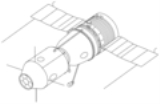
Soyuz A
Encyclopedia
Sergei Korolev initially promoted the Soyuz A-B-V circumlunar complex (7K-9K-11K) concept (also known as L1) in which a two-man craft Soyuz 7K would rendezvous with other components (9K and 11K) in Earth orbit to assemble a lunar excursion vehicle, the components being delivered by the proven R-7 rocket.
Besides the Soyuz 7K spacecraft, the complex would feature a Soyuz 9K booster and a Soyuz 11K tanker with twin whip antennas.
The 7K would have been equipped with cameras and sensors to study the lunar surface during the flyby, at a distance of 1,000 to 20,000 km from the Moon's surface. Total flight time would have been 7 to 8 days.

Besides the Soyuz 7K spacecraft, the complex would feature a Soyuz 9K booster and a Soyuz 11K tanker with twin whip antennas.
The 7K would have been equipped with cameras and sensors to study the lunar surface during the flyby, at a distance of 1,000 to 20,000 km from the Moon's surface. Total flight time would have been 7 to 8 days.

See also
- Soyuz 9K
- Soyuz 11K
- Soyuz programmeSoyuz programmeThe Soyuz programme is a human spaceflight programme that was initiated by the Soviet Union in the early 1960s, originally part of a Moon landing project intended to put a Soviet cosmonaut on the Moon...
- Soyuz (spacecraft)
- ParomParomThe Parom is a space tug that has been proposed by RKK Energia. The purpose of this vehicle is to replace most of the Progress' active components. Progress spacecraft have flown re-supply missions since 1978. Nikolai Bryukhanov, RKK Energia's deputy general designer, said in May 2005 that the...
- Progress (spacecraft)

